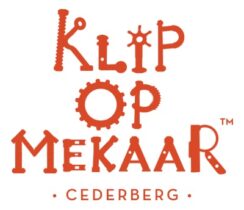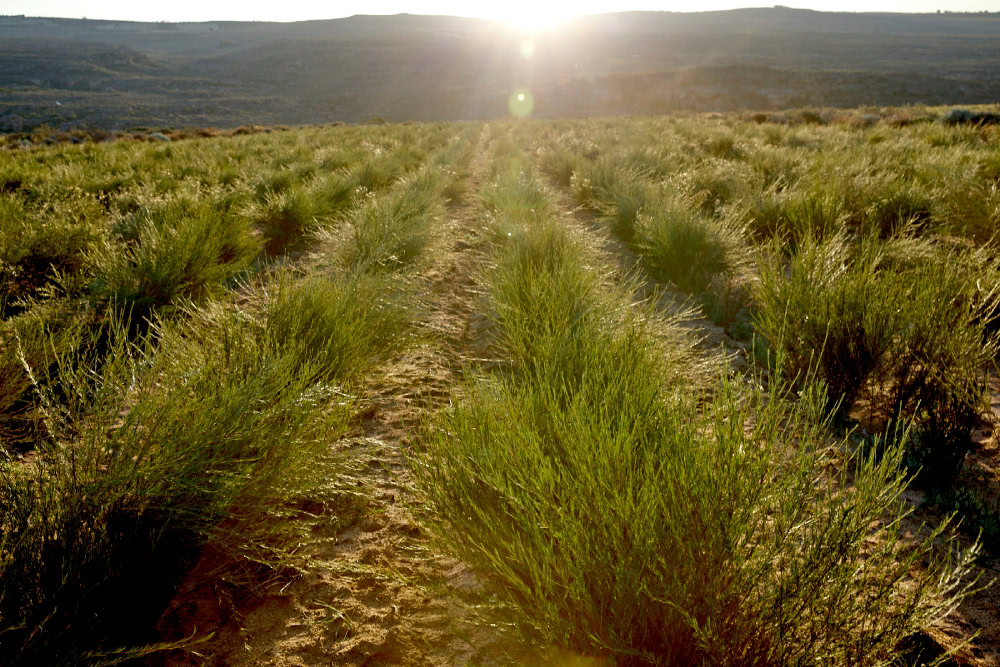As a major sector of the beverage industry, the soft drinks market has historically consisted of a wide spectrum of non-alcoholic beverages. With an estimated global market value of USD 413.46 billion in 2021, this lucrative and fiercely competitive space has been dominated by a handful of major players whose products have typically been carbonated, sweetened, and often caffeinated. Entering this market as a relative newcomer, rooibos in soft drinks has begun to establish itself as an ingredient of growing interest as a result of its inherent versatility, thanks to natural sweetness and suitability as a base ingredient in blends.
In this overview, we provide an outline of the reasons why rooibos is seeing buoyant application in the ready to drink (RTD) soft drinks sector, and drill into beverage formulations that feature rooibos as a primary ingredient, or as a base with which a variety of other flavours are blended.
The Rise of Rooibos: An Opportunity for Soft Drink Brands
The soft drinks market is one that is characterised by being dynamic and ever-evolving. This changing landscape is shaped by a range of factors that include shifting consumer preferences, technological advancements, and regulatory developments. In order to adapt and respond to these changes and remain competitive in a crowded marketplace, beverage brands are by necessity alert to innovation.
To understand the drivers that inform the choice of beverage and tea brands to launch new rooibos products into the RTD market, it is worthwhile to consider the size and growth rates of the global ice tea, carbonated and functional beverage segments. Below are some key statistics provided by leading market analysis firms Statista and Grand View Research:
Ice Tea Products
Market Size:
- The global RTD iced tea market was valued at approximately $22.5 billion in 2022 and is expected to grow to about $33.7 billion by 2030.
Growth Rate:
- The CAGR (Compound Annual Growth Rate) for the RTD iced tea market is estimated to be around 5.2% from 2023 to 2030.
Carbonated Products
Market Size:
- The global carbonated soft drinks (CSDs) market was valued at about $450 billion in 2022.
- The market is expected to grow to around $530 billion by 2030.
Growth Rate:
- The CAGR for the carbonated beverage market is expected to be around 2.3% between 2023 and 2030.
Functional Products
Market Size:
- The global functional beverages market was valued at approximately $125 billion in 2022.
- The market is forecast to reach about $222 billion by 2030.
Growth Rate:
- The CAGR for the functional beverages market is expected to be around 7.5% from 2023 to 2030.
In this crowded and highly competitive marketplace, experimentation with a wide range of ingredients has long been tried as a means of testing consumer appetite for novelty, flavour and in order to stand out. This experimentation has seen a mind-boggling array of ingredients come to the fore, all designed to offer beverage brands a sought-after competitive edge. Whilst meeting consumer interest, these ingredients – whether fruit, vegetable or herbal – must also answer the technical and chemical criteria required of a product suitable for mass production, storage, distribution and consumption.
As the landscape changes, some of these ingredients may fall away in response to waning consumer demand, or be replaced by more suitable ingredients that offer improvement or enhancement of the formulations involved. Examples in this area are herbs and fruits sourced from across the world that impart a wide array of flavours and colours. As time passes, some find favour with consumers, whilst others fade away.
Over the last 15 years, among the ingredients that have risen to prominence and become established as a staple ingredient has been rooibos. For beverage brands looking for a competitive edge that matches the key criteria demanded of a soft drink ingredient, rooibos presents an opportunity that many of the world’s leading beverage producers have capitalised on.
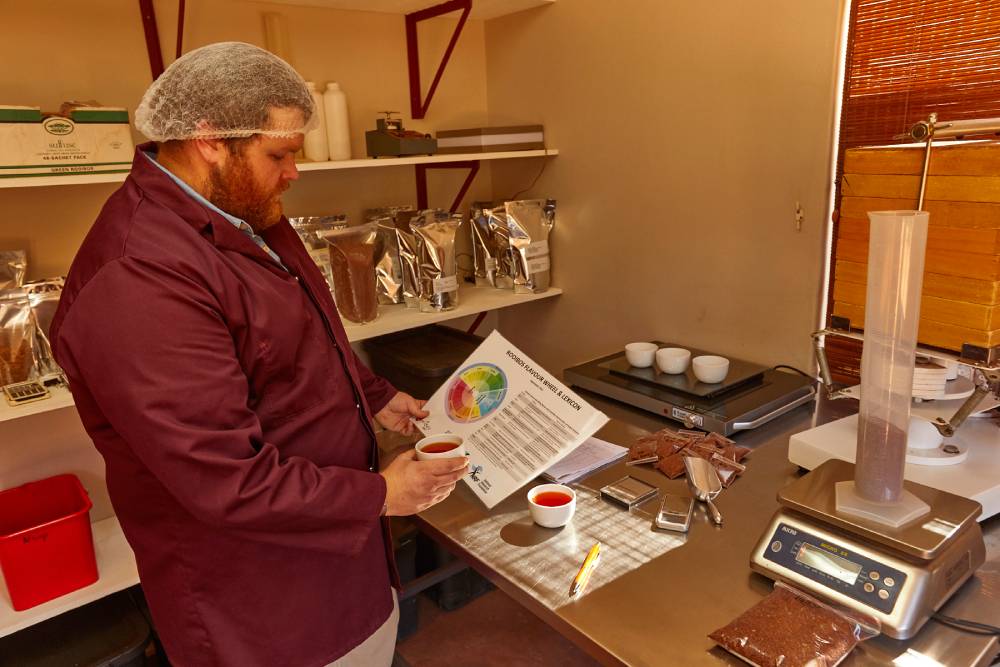
Rooibos As an Ideal Soft Drink Ingredient
Among the reasons that the utilisation of rooibos has grown in the soft drinks sector are a few key characteristics that set it apart from most other ingredients. These include its natural sweetness, which enables formulations to be created that can avoid the addition of natural sugars or synthetic sweeteners. Added to this is its versatility as a base ingredient that pairs well with numerous other flavours and colours. An additional and significant factor that serves in its favour in a market that increasingly seeks out and utilises health-giving ingredients is that rooibos is naturally caffeine-free.
In a market where global consumer awareness and interest has been marked by a gradual shift away from sweetened and caffeinated beverages and toward drinks that offer health-giving properties, rooibos stands out as a natural choice. Because it contains a number of inherently healthy compounds that are becoming better-known to both beverage brands and consumers, rooibos is thus being seen in a wider range of soft drinks, teas and functional beverages.
For beverage brands seeking ingredients that are a good fit for their needs, the organoleptic and functional characteristics of rooibos present an excellent candidate ingredient for new soft drink formulations. By utilising rooibos, these formulations are able to avoid the need to add colourants or sweeteners, whilst also being able to offer consumers health benefit claims that are backed up by a significant – and growing – body of scientific evidence. This combination of suitability for blending and functionality is relatively rare in the world of soft drinks, and is the reason that rooibos is now an increasingly sought-after ingredient that has become more prominent in this sector over the last decade.
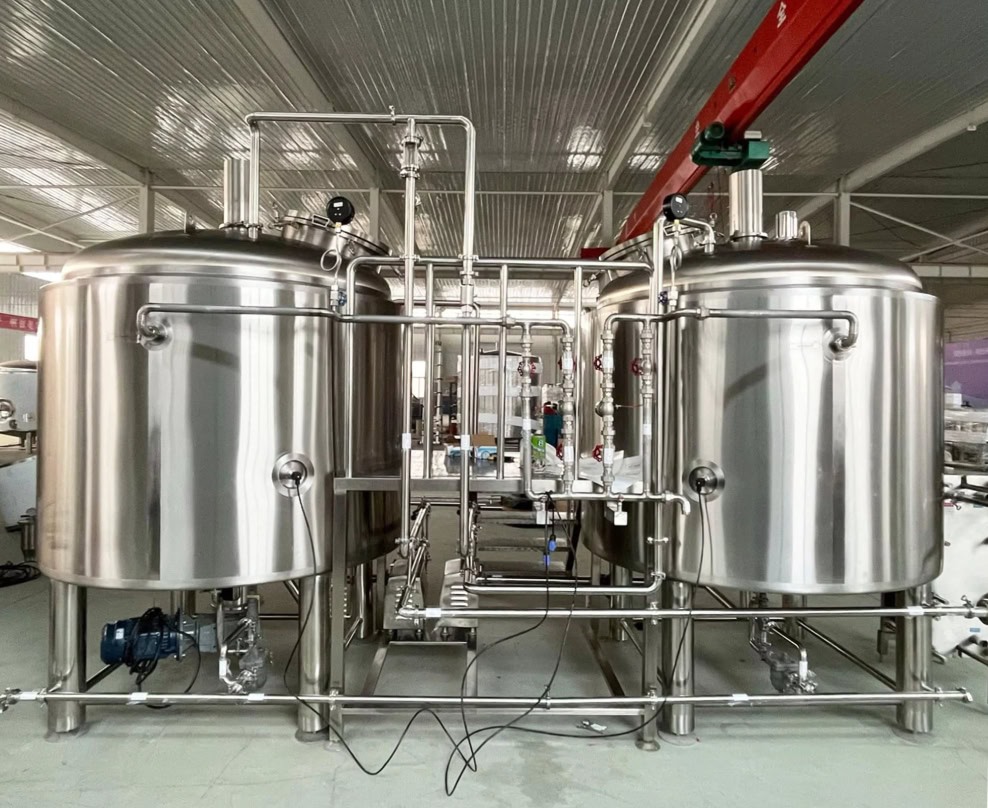
A Versatile Ingredient, Brewed or Extracted
In ready-to-drink beverages, the choice between using brewed rooibos tea and rooibos extract hinges on several key factors that include production processes, flavour profiles, cost, shelf life, and convenience.
Rooibos as a tea is the traditional beverage made by steeping dried rooibos leaves in hot water, in the same manner as with black tea or herbal infusions. The resulting tea features a mild taste profile that provides an excellent blend ingredient which readily provides a base for a growing spread of tea-based drinks available on the market today. However, while pasteurisation can extend the shelf life, brewed rooibos tea tends to have a shorter shelf life than extract-based beverages due to its high water content, which has the potential to encourage bacterial growth and spoilage.
The extract is a more concentrated form of rooibos, and is typically produced by soaking the leaves in water (or sometimes another solvent) and then concentrating the resulting liquid through evaporation to create a final product in either liquid or powdered form. Extract offers benefit to beverage brands as it contains higher concentrations of the active compounds, such as polyphenols, flavonoids, and antioxidants, and can thus potentially provide greater health benefit. Extracts can be more concentrated in taste, and may have a stronger, more astringent flavour compared to brewed rooibos tea.
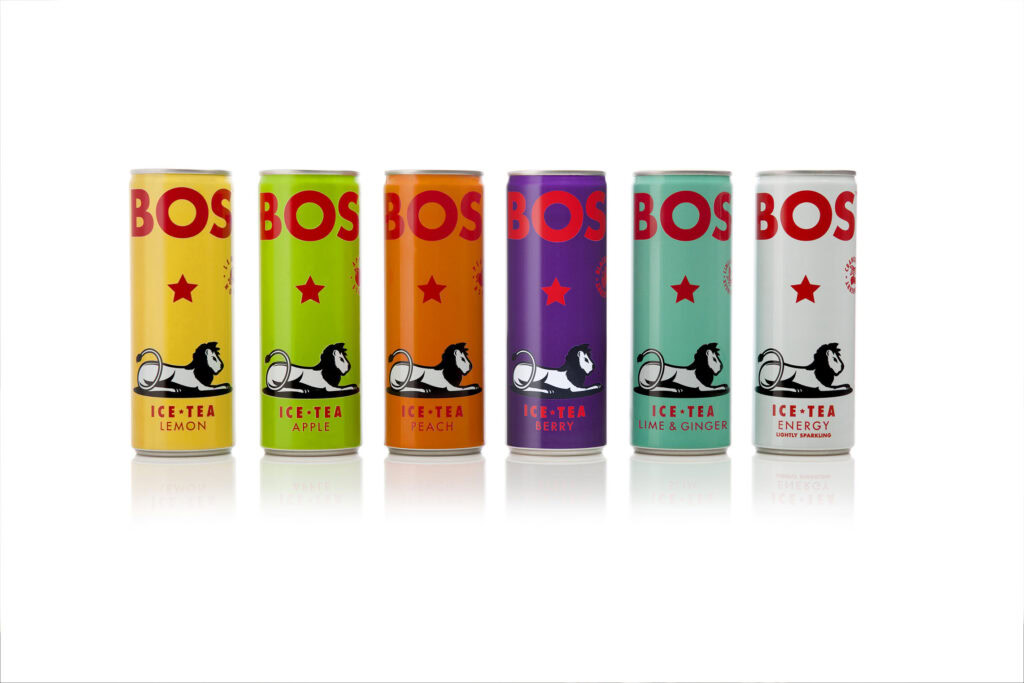
Rooibos Goes Mainstream: A Novelty Becomes a Favourite
As an illustration of its rise to prominence, consider that the first commercially produced rooibos soft drink is believed to have been “Rooibee Red Tea,” which was launched in the United States in 2009 by the Rooibee Red Tea Company, based in Louisville, Kentucky. In the greater scheme of the beverage sector – which is broadly agreed to have been initiated by the introduction of flavoured and carbonated drinks in the 1880s in the USA – the entry into the soft drinks market by rooibos could be considered as a very recent development.
That the USA would be the first country to experiment with rooibos in a soft drink makes sense: it is after all the world’s largest market for products of this nature. Interest in South Africa (the only country in the world where rooibos grows and has a centuries-long history) would follow as a matter of course is not surprising: following hot on the heels of the Rooibee Tea Company is the now well-established BOS brand, which saw its first products on shelves in Cape Town in mid-2010.
Established in 2009, the company was founded by entrepreneurs Grant Rushmere and Richard Bowsher. Having started rooibos production at Klipopmekaar in 2007, Richard sought a market for the organic rooibos produced on our farm, and along with Rushmere created BOS as a means to market and distribute what was at the time a unique product in the South African marketplace. To this day, Klipopmekaar remains the sole exclusive supplier of the key ingredient found in all variants of the BOS brand’s products.
Since 2010, and the wake of the successful growth and international distribution of BOS, and following increased consumer awareness of the benefits of rooibos, the number of rooibos products in the soft drinks market has seen marked growth, as seen in the proliferation of new products across the globe. These include a wide spread of RTD products in the form of ice teas, non-carbonated and carbonated drinks, sports drink formulations and also cordials.
Below, we unpack these by type and category to provide a snapshot of the variety and nature of rooibos products in the soft drinks market.
Rooibos in Soft Drinks by Type
When one thinks of rooibos, the association is almost always of it in the form of rooibos tea. And whether in its homeland here in South Africa, or elsewhere across the world, it’s in this form that rooibos as a ready-to-drink formulation has seen rapid growth over the last 15 years since BOS came onto the market. Riding on the familiarity and taste of rooibos tea makes good business sense, as rooibos tea provides an accessible route of entry for all ages, and all tastes.
Ice Teas
Following in the wake of BOS, and to some extent enjoying the market penetration established by the brand, initial and early entrants to the soft drinks markets were some of the world’s largest tea brands.
Among these were Lipton, whose range of iced teas had already established its presence as a rival to carbonated and caffeinated soft drinks, and to which a rooibos variant was added in 2011. In the same manner, Clipper, another leading UK-based tea brand, introduced their own version of a rooibos ice tea not long after. Since then, the global appetite for rooibos ice tea drinks has rapidly expanded and is characterised by a growing number of rivals competing for consumer attention.
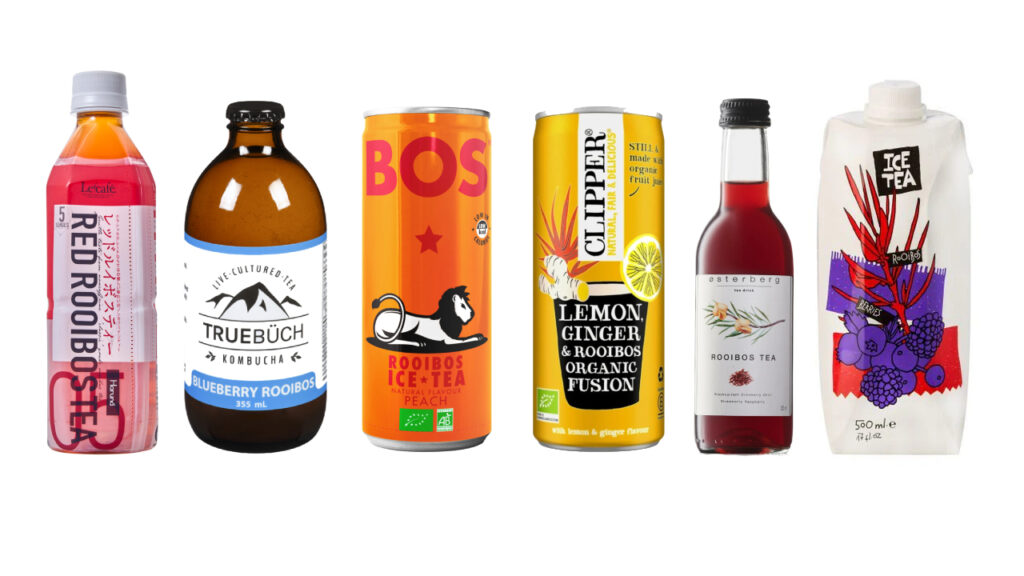
It is worth highlighting that among the leading tea brands mentioned above, not a great deal of differentiation is seen among competing rooibos ice tea products. This is likely as a result of consumer tastes – but it is also the possible reason that new entrants have distinguished themselves by adding variations on the theme.
Thus in Denmark the Østerberg brand’s product contains the juices of apple, blackcurrant, purple carrot, lemon, cranberry, raspberry, strawberry – and also a dash of chilli. In Japan, the Haruna company’s Le Cafe brand adds berries (a popular combination shared by many other brands in the space) to its Red Rooibos Tea, as does the Aytac brand in Turkey with its Rooibos & Berries product – and staying with berry combinations, in Canada the TrueBuch brand out of Calgary has added its own local favourite, blueberry.
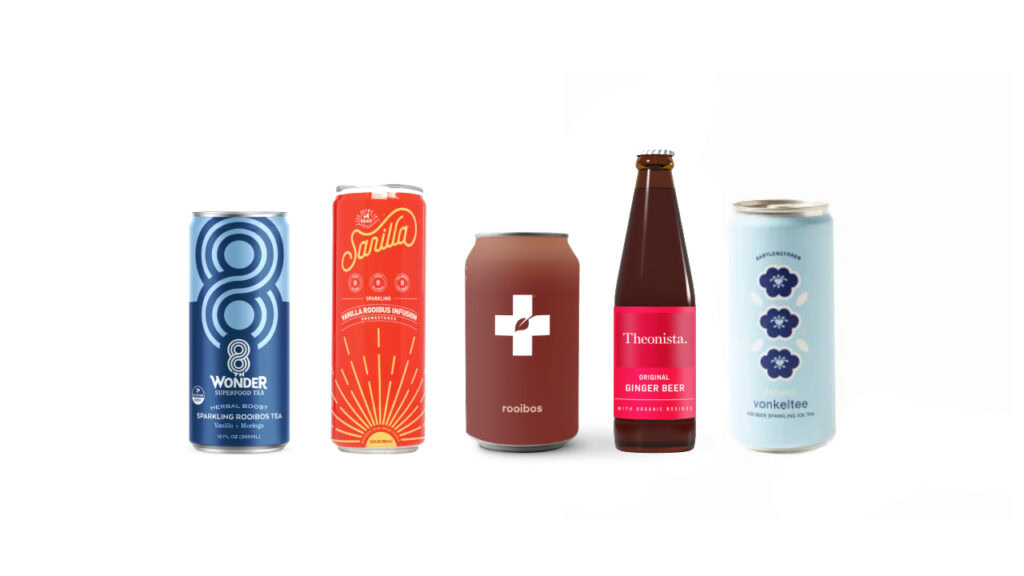
Carbonated Rooibos Teas
Though rooibos RTDs have historically not been sparkling, this is an area where changes are afoot – and of the first to move into this segment was BOS, which introduced its unsweetened sparkling iced teas back in 2019.
Taking this lead, two brands in the USA – including the minimalist-design New York-based brand Motto, and Sanilla from North Carolina – rolled out their own versions, and in the UK, 8th Wonder have recently brought their own sparkling rooibos tea onto the market.
Not one to rest on their laurels, in South Africa the Babylonstoren wine estate has recently launched its Vonkeltee variant, dressed in the brand’s distinctive pared-down and retro look and feel – and the Theonista brand has rolled out a ginger beer, with rooibos as its base flavour.

Functional Beverages
With scientific evidence of the health-giving benefits of rooibos now becoming well-established as a result of numerous studies that look into rooibos’ antioxidant properties, its relevance in terms of glycaemic index, the gut biome and the cardio-vascular system, non-alcoholic rooibos-based beverages offering consumers a functional benefit are now becoming more numerous across the world.
Referencing the longstanding reputation of rooibos as having a benefit to gut health, in South Africa, the Switch brand has launched a rooibos variant touted as an immune support probiotic. Using a different approach, the VitHit brand in Ireland and the UK has positioned its rooibos and ginseng formulation as an energy boost. In Singapore, the Curated Culture brand has launched its rooibos product as a detox and prebiotic solution, and is traded beyond Singapore under the Nektrh name.
Further afield, the You Plus One brand from the UK has added the benefits of echinacea and the Ayurvedic adaptogenic ashwagandha, whilst in the USA, the Gist brand has expanded its range with the addition of a ginger and rooibos with prebiotics.
This is a segment to watch, as further studies adding to the existing body of evidence showing the benefits of rooibos as part of a sportsperson’s diet regime, and to gut health specifically, will likely make for new entrants in what appears to be a growing area of interest for tea and beverage brands.
A Fast-Moving Space With Rooibos at its Centre
Our ongoing informal research into the use of rooibos in the soft drinks and functional beverage categories has revealed that over time, the prominence of rooibos in the general market is on a steady upward trend. This is apparent from the emergence of upwards of 25 new products to the global soft drinks market over the last few years since we performed our initial analysis in 2021, in our Rooibos In The Beverage and Wellness Sector article.
This marks a significant shift and points to the widespread interest in, and uptake of, rooibos as a key ingredient – a notable achievement for a herbal ingredient which only two decades ago was largely unheard of beyond the only country in the world in which rooibos is grown.
In summary, the key takeaway is that the technical and organoleptic properties of rooibos are considered by beverage brands as something of an ideal ingredient, perfectly suited to the technical requirements of the development of innovative new formulas, whilst offering consumers a range of benefits beyond taste alone.
Additionally, based on the proliferation of new products in recent years, it is evident that both the world’s most established and leading premium beverage and tea brands, as well as new entrants to the market, continue to view the commercial prospect of rooibos products favourably. With these key aspects considered as a whole, it would be reasonable to anticipate that the continued buoyancy of rooibos soft drinks in the global marketplace is set to continue, and holds significant potential as a growth area.
For more information on rooibos in beverages and other products, see these other articles here on our website:
